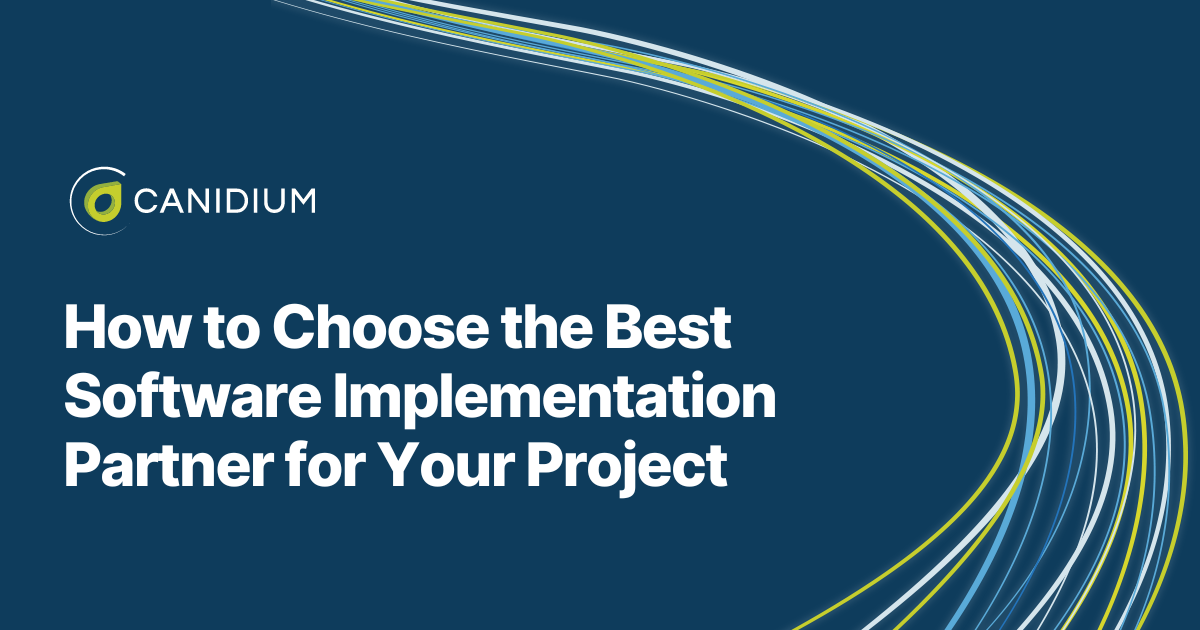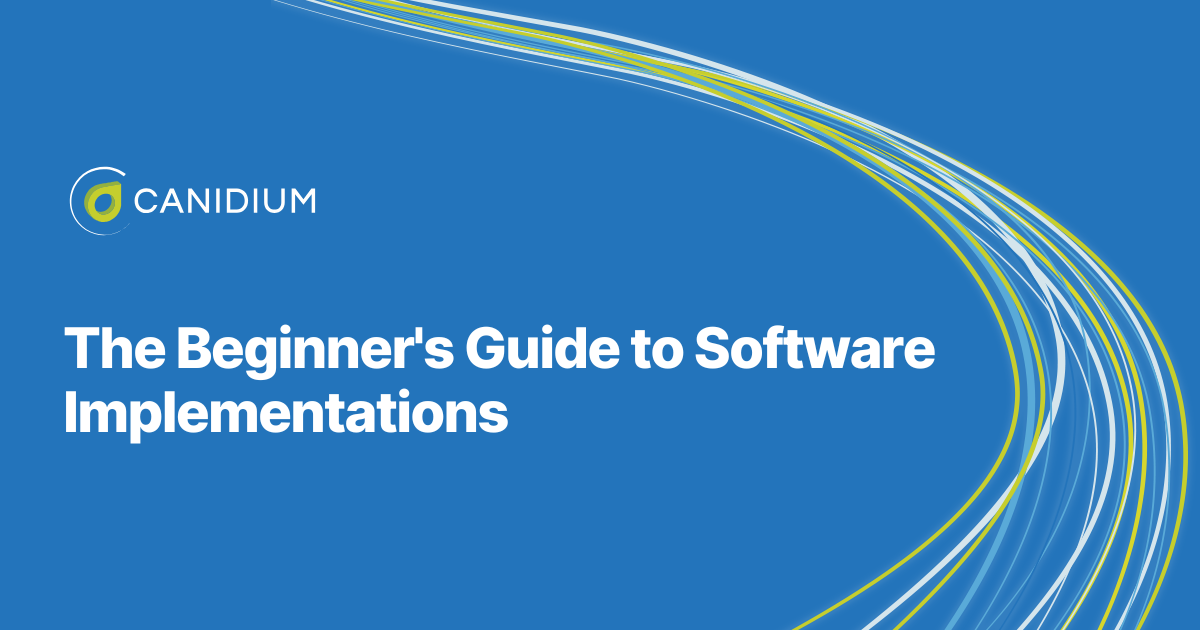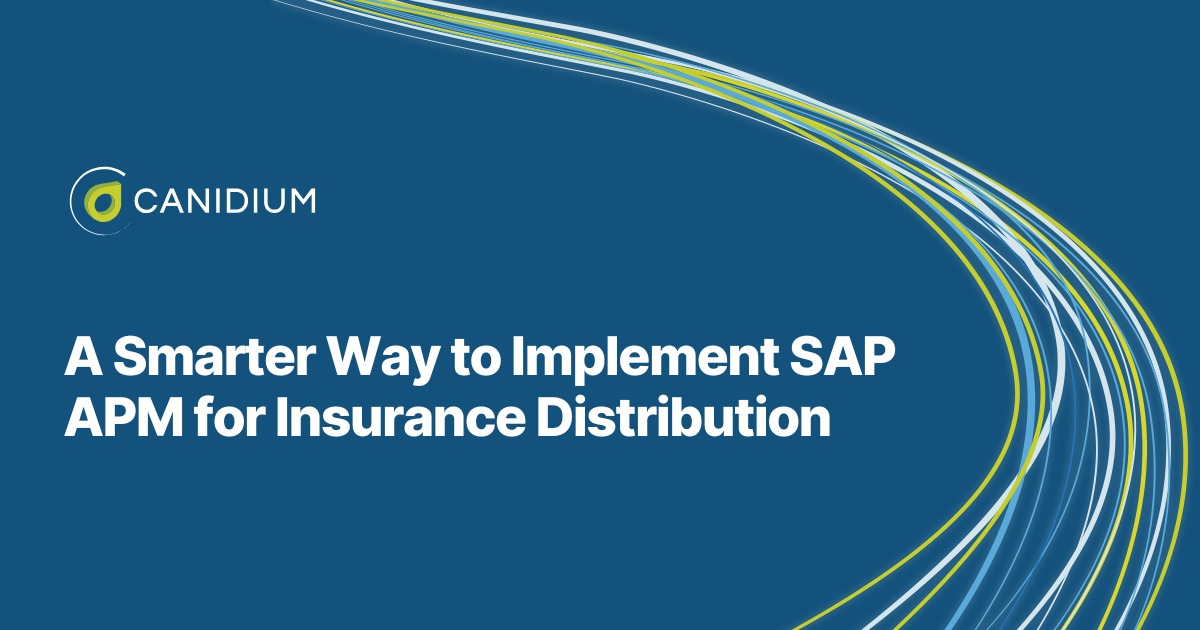Selecting the right software implementation partner is crucial, as it significantly influences the quality of your system design and configuration. The effectiveness of the implementation execution makes or breaks your project ROI and can impact daily operations for the lifespan of the new solution.
At Canidium, we educate clients on implementation processes, helping them determine the right time to conduct a project, which solutions to choose, and how to select the right partner. We have been conducting implementation projects since 2008.
Based on our decades of experience, this article outlines six factors clients should consider when looking for a software implementation partner.
- What does a software implementation partner do?
- The 6 selection factors you should know before choosing your software implementation partner
What Does a Software Implementation Partner Do?
As business operations increasingly rely on advanced digital solutions to keep up with the hyper-efficient demands of competitive markets, highly skilled and specialized software expertise is in growing demand. However, it is financially impractical for companies to have solution-specific experts on staff for every new implementation project they undertake. For this reason, external software implementation partners are an increasingly invaluable resource for businesses, as evidenced by the growing outsourcing industry. Between 2024 and 2029, IT outsourcing revenue is projected to grow at a CAGR of 8.03%.
A software implementation partner is a crucial extension of a company's internal team, providing expertise and resources that might not be feasible to maintain in-house due to cost or infrequency of need. Here's a breakdown of the core functions and benefits that such a partner brings to a business:

6 Selection Factors When Choosing Your Software Implementation Partner
Your choice of software implementation partner is as important as the solution you are integrating. The quality of your system design and configuration, as well as how smoothly the project is executed, has a controlling impact on your ultimate ROI. Therefore, selecting the right software implementation partner for your project is vital.
There are six critical factors that you need to consider when looking into software implementation partners. Let's go through each one:
.png?width=1920&height=1080&name=What%20Does%20a%20Software%20Implementation%20Partner%20Do%20(1).png)
1. Multilingual Capabilities
Globalization is a fundamental driving force of economic growth today. Companies cannot ignore the opportunities global trade presents and the inherent potential of entering new markets by engaging in international business. Today, the sum total of exports and imports amounts to more than 50% of the value of global output. In short, you will need to participate in the global economy to achieve your maximum business potential.
Successful businesses are no longer contained by their nation's borders. Consequently, companies must restructure and expand operations to include talent that serves the demands of different markets. For instance, to accommodate globalized operations, 90% of US employers demand multilingual talent in their workforce.
Software implementation partners with multilingual workforces can operate more effectively in the globalized marketplace. Linguistic and cultural competency allows partners to operate seamlessly across borders, enhancing communication with clients and partners across regions. In our experience, having a multilingual workforce has allowed us to ensure that all communications—whether they are project discussions, legal documents, or marketing materials—are accurately translated and culturally aligned, reducing the risk of miscommunication and building stronger, more trusting relationships with clients. Our Spanish-speaking resources in our Costa Rican nearshore team not only give us a multilingual edge, but they are also intimately familiar with the cultural nuances that can influence business operations and client relationships in Latin American markets. Beyond Costa Rica, our team spans 7 countries and 27 US states, helping us serve the globalized marketplace with greater acumen.
If you are a global company or interested in expanding beyond your current borders in the future, you should ask your potential software implementation partner what measures they have in place to serve international clients.
2. Time Zones
In the same vein as multilingual capabilities, time zones can significantly affect an implementation project. The complexity of the process requires significant collaboration with your internal teams, meaning additional factors such as time zone differences can slow down the project and expand budgets.
Offshoring is common for IT projects. However, stunted communication between teams working on different schedules can compromise the value of the ultimate deliverable. Decisions cannot be made as quickly, and real-time collaboration with internal resources is no longer possible.
"Global partnerships are forming to take advantage of the cost savings associated with offshoring as well as other strategic benefits. Not all information technology offshoring projects, however, are successful. Cost overruns, increased complexity and defective code cause organizations to rethink their offshoring strategy and their methods for managing these projects." - Project Management Issues in IT Offshore Outsourcing
These issues are why our approach to managing global partnerships is extensively thought out. With teams located across the globe but primarily based in the US, our ability to work within customers' time zones allows for real-time collaboration and immediate responses; we have found this benefit crucial for maintaining project momentum and meeting tight deadlines.
Moreover, this aspect of our operational strategy is particularly beneficial when urgent tasks must be completed outside regular business hours. For instance, we can mobilize resources from our India-based team to handle overnight requests, ensuring that work progresses around the clock without sacrificing quality or timelines. Consequently, we can leverage international talent and work through different time zones while also maintaining our primary teams within the US, catering to domestic client operations.
3. Engaged Leadership
When selecting a business partner, their productivity levels will impact yours. This means that successful partnerships have the capacity to quickly improve employee engagement and output. In contrast, unproductive partnerships will drag down your operational outcomes. As such, it is imperative that you take potential partners' level of employee engagement and productivity into consideration before partnering with an external resource.
Engagement on the leadership level is one of the best indicators of a workforce's performance. As company leaders set the tone for the entire hierarchy, you can look at potential software implementation partners' C-suite performance to get a strong idea of how skilled, motivated, professional, and productive the organization as a whole will be.
Hands-on leaders typically drive a culture of excellence throughout their organization. In contrast, disengagement among managers and leaders may indicate a lackadaisical approach within the rank and file. The highest driver of employee engagement is whether workers feel that their leaders care. Yet, seeing as only 33% of US employees are engaged, and 17% are actively disengaged, you cannot simply expect that potential software implementation partners have an engaged workforce. You must evaluate your potential software implementation partner's engagement levels by investigating their leadership.
For example, our leadership is deeply engaged in the day-to-day operations. We operate with an open-door policy, where employees at all levels directly access senior leaders, facilitating open communication and quick decision-making.
This approach has tangible benefits. It ensures that our company's core values are not just nominal but actively practiced, fostering an engaged workforce that lives out leadership's initiatives. At the same time, clients are able to more directly benefit from the in-tune decision-making and extensive experience of the firm's highest-level leaders. This allows employees at each level of the organization to achieve better outcomes.
Because of the transformative impact of leadership engagement, you should ask prospective partners about how hands-on their C-suite is early on in the investigative process.
4. In-House Operations
One often overlooked factor that can significantly affect your implementation project is the presence of in-house accounting and legal teams. Software consultancy firms often operate as highly streamlined, lean teams of specialized IT professionals. However, in our experience as a software implementation partner, having in-house accounting and legal services comes with several benefits.
Firstly, this internal structure is particularly advantageous when addressing small but crucial questions in legal or financial documents. Since the teams are readily available, responses can be quick and direct, minimizing delays and avoiding holdups when external parties are involved. This setup not only speeds up the workflow but also ensures that information is handled securely and with a consistent understanding of the company's goals and client needs.
Moreover, clients typically experience fewer delays because in-house services allow us to quickly address and resolve issues internally. In contrast, other firms might face longer wait times as they navigate the external bureaucracies of outsourced legal and financial services. So, when evaluating potential partners, inquire about how they manage accounting and legal matters.
5. Company Culture
The value of a strong company culture extends beyond factors like employee happiness or retention rates. Compared to poorly culturally integrated counterparts, teams with a strong sense of shared purpose and values have a 17% increase in performance. A better culture within your prospective software implementation team will translate to a smoother project and improved solution outcome.
The idea of team culture impacting performance bears out in practice. Our strong cultural foundation significantly impacts operational effectiveness and the quality of service offerings. By maintaining a cohesive and value-driven team, our teams can execute projects with a high degree of collaborative competency, contributing to better client outcomes.
You can get a good idea of what your prospective implementation team's culture is like by asking directly what values they ascribe to, but also by simply observing how they communicate and collaborate.
When selecting your software implementation partner, be sure to ask questions about the team structure, who manages each stage of the implementation process, the experience and expertise of individual team members, and how they work through challenges when they arise.
6. Proven Expertise
The fundamental reason you work with a software implementation partner is to leverage their project expertise. Thus, it is no surprise that the track record of your prospective partners is of vital importance.
You should thoroughly examine each prospective partner's experience, including their tenure and specialization, to get a better idea of their capabilities. For example, you may want to look for a partner with experience implementing the specific solutions you are integrating. Moreover, you should ask software implementation partners for past references or case studies demonstrating their ability to deliver effectively designed and configured solutions that seamlessly integrate with your existing infrastructure.
Take, for example, the track record of our implementation teams at Canidium. Established in 2008, Canidium has a long-standing presence in the incentive management field. Our team's experience extends through significant shifts in the industry, including the pivotal acquisition of CallidusCloud by SAP in 2018. Since our founding, we have expanded our offerings to include dedicated pricing, ICM, insurance, fintech, CPQ, CRM, PSA, and PM teams. Today, our talent includes professionals with extensive, solution-specific expertise in each implementation practice.
Many of Canidium's consultants have been working for and with prominent solutions prior to their experience with Canidium, providing them with a nuanced understanding of both legacy and current systems. This dual knowledge base is particularly beneficial for clients transitioning from older systems to newer technologies, as it promotes smoother integrations and more strategic implementations. Plus, the long-standing experience of these team members allows us to handle complex scenarios effectively.
Examining the historical performance of your prospective partners allows you to ensure you are entering into a fruitful partnership with dedicated professionals before you sign your contract. The high-level overview of Canidium's track record is a good start. However, you will want to go more in-depth as you narrow down your list of prospective partners. Speak to team leaders regarding their specific expertise in the solution you want to implement. At the same time, investigate their project management approach to see how they overcome challenges. You may also want to ask questions about implementation processes like requirements gathering to see how dedicated they will be to configuring the solution to your needs.
Choosing the Right Software Implementation Partner
When choosing a software implementation partner, consider these key factors: the need for multilingual capabilities for global market operations, effective management of time zone differences to keep projects on schedule, the engagement level of the partner's leadership, the advantages of in-house operations for streamlined processes, the cultural alignment of the team for better collaboration, and a proven track record of handling similar projects successfully. Evaluating these aspects will help ensure that your chosen partner can not only manage the immediate demands of the implementation but also support the future growth and efficiency of the implemented solutions.
Finally, the last critical factor you need to consider is the price of your implementation. This varies depending on the solution you choose to implement, your project's scale, and other potential contingent factors. However, if you are interested in getting an estimate of what an SAP SuccessFactors Incentive Management (SFIM) Implementation project may cost for your organization, check out this comprehensive buyer's guide.








